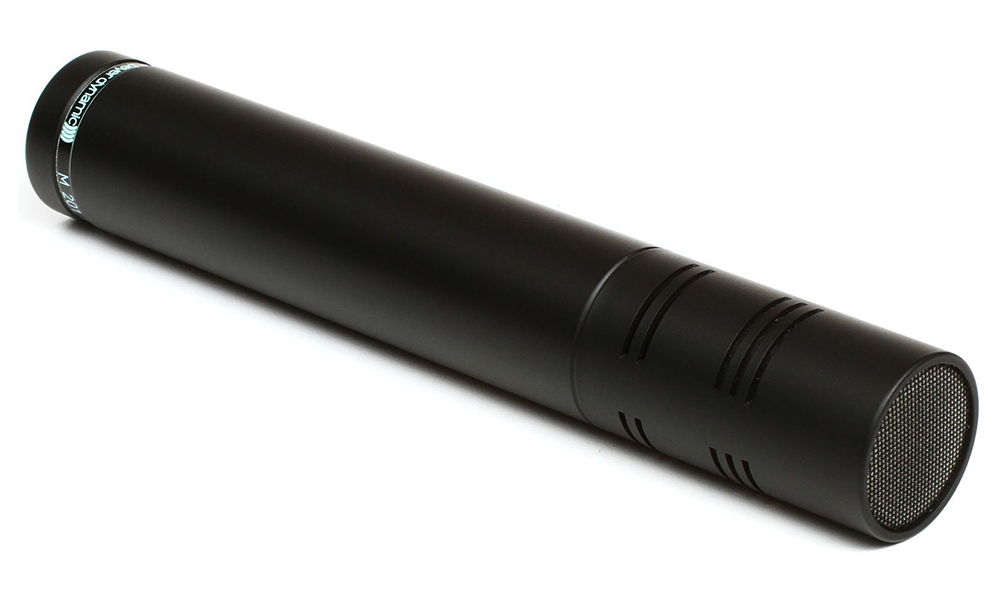In this article we’re going to review a microphone that looks like a small diaphragm condenser but it’s actually a dynamic mic.
We’re talking about the Bayerdynamic M201 TG and for this review and to test this microphone we got it connected directly to the 2i2 2nd Gen with the input gain set at around 4 o’clock.
What’s in The Box
Let’s talk about what comes in the box. First off everything comes in a very nice storage bag. You do obviously get the microphone, you get a foam windscreen, a microphone mount which does come with a 5/8 to 3/8 inch microphone stand adapter, you get some documentation which includes a measurement of the actual microphone that you receive.
Build Quality
As far as the build quality, Bayerdynamic M201 TG feels like an absolute tank which is what you would expect because it has TG in the name and when Bayer dynamic puts TG in the name that means tour gear so it better be ready to stand up to the abuses of tour.
It does have an all-metal body as well as a really nice amount of weight to it. In front of the capsule or diaphragm it does have a metal mesh grille but it definitely does not stop any sort of plosives and on the bottom there is the XLR port and that’s actually it because this is another one of those microphones that is just very bare-bones and focuses on doing one thing really well.
Specifications
As far as the specs, this thing has a hyper-cardioid polar pattern, a frequency response of 40 Hertz to 18 kilohertz, a sensitivity of around negative 58 decibels, it has an output impedance of 200 ohms.
For this review we wear a headphone and it is due to the fact that this microphone is so bad at rejecting plosives or any kind of air that you will need to make sure that its not causing any air to hit the diaphragm so if you look directly at the microphone and breathe out you can really start to hear it or if you use please bring Pizza pronto plosives you can really start to hear it as well so this does not do very well at plosives at all.
It is definitely not the best performing mic out there but it does a pretty good job in case you want to use this as a stage vocal microphone.
PROS & CONS
Lets have a look at the pros and cons of Bayerdynamic M201 mic.
PROS
First up in terms of pros we think the tone of this microphone is a really nice and the build quality of this thing is absolutely insane and we think it will last you a really long time.
CONS
In terms of cons, this microphone is really quiet with a sensitivity of around negative 58 or negative 59 decibels so if you’re at all concerned with preempt noise you need to make sure you have a very nice clean and powerful pre in the studio. It also didn’t do a very good job at plosive rejection probably because it wasn’t designed for vocal use and it didn’t do a good job with handling noise again probably because it wasn’t designed to be handheld.
Overall Thoughts
As far as our overall thoughts of this microphone, on the electric guitar it definitely gives you a warmer tone and it’s not as boosted in the high end as a lot of other dynamics so you’re not going to be getting a very aggressive tone in comparison to something like the sm57 on the acoustic guitar.
You can get a good amount of attack from the guitar pick as well as some added brightness if you might get a little bit closer to the neck but it is still a relatively dark or relatively warm sounding microphone for that instrument.
Lastly for singing and spoken word if you are at all close to the microphone you will end up with a very warm tone that focuses quite significantly on the low mid section but it does sound really nice really smooth and really buttery.
But, if you are close to the microphone you will still have to contend with those plosives because this thing does not do good with that.
Conclusion
So, would we recommend this microphone? Well, we’ll start by saying we actually really like the tone of this microphone because compared to other Bayer dynamic microphones this has a much more neutral tone or at least it doesn’t sound as boosted in the end for live instrumentation.
If you are looking for a warmer, less treble boosted microphone we think this thing is incredible and we would absolutely recommend it for that but the reason that we picked this microphone up in the coolest use case in our opinion is for spoken word because you can get that really buttery smooth, warm lows and low mid section and it does offer a decent amount of clarity.
Although it does still lean on the side of being a bit darker and it does really suck with plosives and if you get right on top of the microphone it can get a little bit boomy or boxy due to the proximity effect.
We hope our Bayer Dynamic M201 TG review would have provided you with all the info you might have been searching for.
Feel free to comment below if you have any question.



